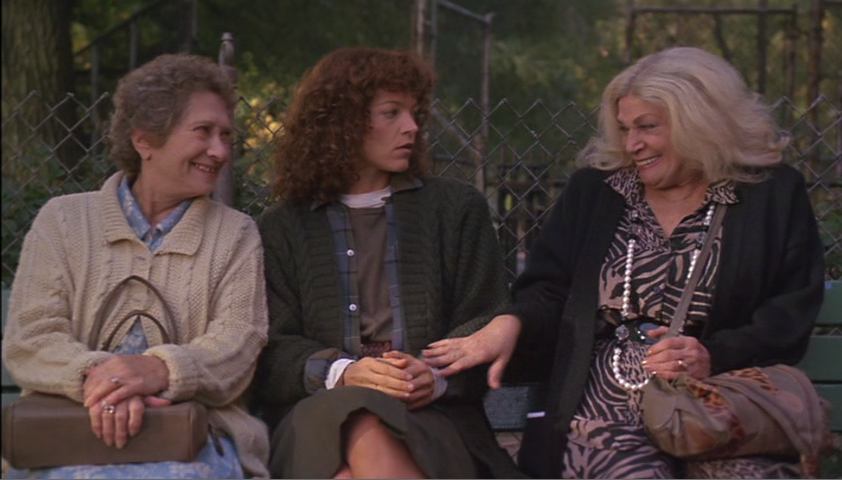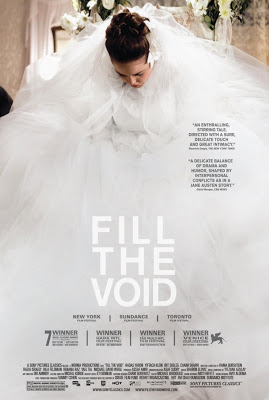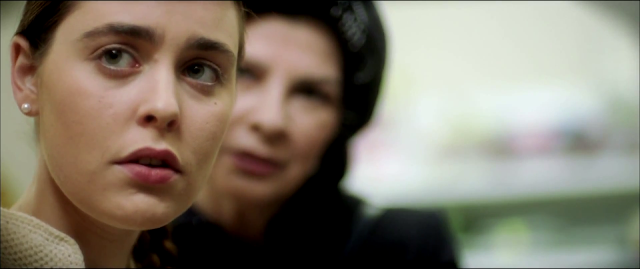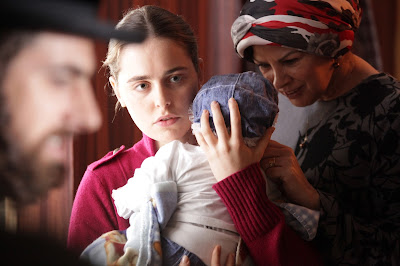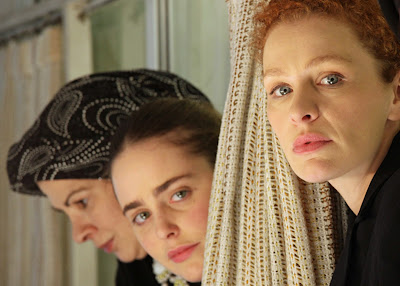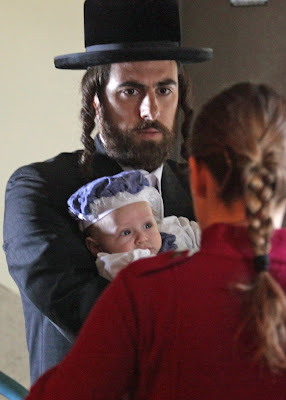This guest post written by Susan Cosby Ronnenberg appears as part of our theme week on Ladies of the 1980s. | Spoilers ahead.
Crossing Delancey (1988) is a romantic comedy featuring Amy Irving, directed by Joan Micklin Silver and written by Susan Sandler, based on her original play of the same title. The tagline was, “A funny movie about getting serious.” This rom-com has always been more of a cult classic. But it was unusual in its female writer and director, along with its distinctly Jewish cultural setting, its generational custom-clash regarding matchmaking, and its conflicted independent protagonist, Isabelle, who could be read as a late 1980s precursor to Sex and the City’s protagonist Carrie Bradshaw (Sarah Jessica Parker). An independent, straight single woman with a successful career, Isabelle has professional and romantic options, ambitions, and flawed preconceptions about the incompatibility of those options and ambitions as she tries to decide between an internationally acclaimed poet or a neighborhood. Yes, you read that correctly: poet or pickleman.
Isabelle “Izzy” Grossman (Amy Irving) is irritating and relatable at the same time. She’s an ambitious and successful publisher in Manhattan, where, as she insists to her grandmother, she organizes “the most prestigious reading series in New York City.” She sees herself as modern, forward-looking, cultured, and sophisticated. But she’s also self-centered, snobbish, dismissive, and deceitful. While she possesses many fine attributes, she’s flawed; I like both of those aspects of her that make her fully human. At 33, with one of her peers becoming a new mother, Izzy looks around at her life, wondering about advancing her personal life as she has her professional one. This is a common theme among 1980s romantic comedies, such as Baby Boom (1987) with Diane Keaton and Working Girl (1988) with Melanie Griffith. One of her romantic prospects, a novelist, quotes Confucius to her at dinner one night, “Ripe plums are falling. Now there are only three. May a fine lover come for me”, adding reassuringly, “Lots of ripe plums left on your tree, Izzy.” He seems to recognize her distraction over the passage of time and still being single, which has become an issue with her grandmother.
Izzy has three men in her life: Nick (John Bedford Lloyd), an old boyfriend/friend with benefits, now married, but who crashes at her place on a regular basis when he and his wife fight; Anton Maes (Jeroen Krabbe), a NYC-based Dutch critically acclaimed novelist, also married but separated, famous, creative, cosmopolitan, and intellectual; and Sam Posner (Peter Riegert), who lives and works on the Lower East Side near her grandmother’s home, the owner and operator of his father’s pickle shop on Delancey Street. Sam and Izzy meet through the pressure of her grandmother, “Bubbie” Kantor (Reizl Bozyk), and Mrs. Mandlebaum (Sylvia Miles), a traditional professional Jewish matchmaker.
To Izzy, to cross Delancey is to return to the past, “100 years” and “a million miles away” from her own life, to her grandmother’s world. She does so often and willingly, providing company and care for her beloved grandmother. But she has no interest in a man who has chosen to remain in that neighborhood, doing the same food sales work that his father did, and, she assumes, contracting a matchmaker to find a bride. It clearly seems archaic and a little desperate to her.
The setting takes place half in Manhattan — in Izzy’s apartment, her place of employment, and out socializing with friends — and half on the Lower East Side — in Bubbie’s vibrant and diverse neighborhood, historically a predominantly Jewish community. It’s clear that, in trying to leave the old world and its ways behind as she makes her way in the new, modern world, Izzy has made some arrogant and faulty assumptions that will require Bubbie’s willingness to interfere.
Passing the Bechdel test, Crossing Delancey features conversations between Isabelle and Bubbie about Bubbie’s health, the neighborhood, Izzy’s dreams and what they might mean, and Izzy’s parents. Izzy actively seeks to support her friend Rickie’s new role as a single parent with a sometimes supportive boyfriend. She also supports her publishing colleague Chinchilla Monk’s new public access show on the local performance art scene, which features a feminist performer.
Izzy attends a bris for the baby of a high school friend of hers, where the film shows us a group of four women in their thirties sustaining a friendship from their teenage years. Two are single, one is married, and one is a new mother with a boyfriend. One of the women refers to the bris as, “Our first baby!” We see the women friends together in varying pairs throughout the film. This group resembles Sex & the City’s foursome of Carrie, Samantha, Charlotte, and Miranda, minus the multi-thousand dollar stylish and sexy wardrobe. Marilyn, in particular, reminds me of Elaine Benes from Seinfeld, which debuted a year after this film came out.

The film’s costuming is refreshing given the frequent sexualization of women in film through wardrobe today in most mainstream movies. The late 1980s is the era of the three-quarter or tea-length casual dress, with both dresses and shirts buttoned to the top, but without appearing constricting. Izzy’s clothes are appropriate for her varied activities: jogging, working at the bookstore, spending time with her grandmother, going on a date. What struck me most was that she looked nice and comfortable and her shoes were practical; she was dressed as many women in real life dress. There were no extra tight outfits, short-short skirts, stiletto heels, or plunging cleavage — at her place of employment or anywhere else. She was obviously meant to be doing things, not just to be the object of the Male Gaze: on display but not functional.
Crossing Delancey and Sex and the City share parallels as both Izzy and Carrie Bradshaw are thirty-something straight white women with successful careers and a support network of female friends. Both long for romance, question the idea of meeting someone who meets their requirements for a boyfriend, much less a husband, and both make selfish and deceitful decisions.
Izzy decides she doesn’t have chemistry with Sam but she likes him, so she attempts to set him up with her high school friend Marilyn, who recently complained that on a given first date she has “forty-five minutes to make this guy think I’m great, when I’d rather be home in my pajamas watching baseball.” But Izzy doesn’t tell Sam that she’s setting him up. Instead, she offers an apology for some of the things she said to him earlier and invites him to have dinner. She plans with Marilyn to “run into her” at the end of dinner, then leave her with Sam. Only the more Izzy talks to Sam, the more she likes him, and the longer she delays the introduction until Marilyn calls her on it and introduces herself. Sam feels used, but blames Izzy, not Marilyn, demanding “What’s there to be sorry about? She’s funny, direct, honest,” with the clear implication that Izzy is lacking in the latter two areas in particular. Afterward, Izzy pines after Sam with her other friends and her grandmother, until Bubbie brings Sam back into contact with Izzy.
Despite things finally seeming to click with Sam, Izzy allows Anton to persuade her to stay late after work to read part of his new novel. He flatters her and, knowing she has a date with Sam, encourages her to make him wait. Foolishly, she does, despite having spent time and money purchasing a new dress for the date and being eager to see Sam. Izzy realizes belatedly her error, in thinking that the mysterious and suave Anton wants a romantic and professional relationship with her when he’s looking for a part-time assistant and a convenient casual sex partner. Astonishingly, Sam has waited for her. He’s a man with the patience of a saint, but he’s not a doormat. In some ways this is a gender-reversed romantic comedy. It’s Izzy who races frantically across town, having come to the belated conclusion that she has been grossly overlooking, underestimating, and underappreciating who Sam is and what he has to offer.
The film presents us with three vivid visual images of groups of women in the city: at the senior center the women’s defense workshop that Bubbie participates in as Izzy watches in amusement; the after-work crowd in the deli/grocery, which includes Izzy, selecting dinner for one to-go from the salad bar; and the long line of pregnant women who file past Izzy and Sam in the entrance to her apartment building. These seem to suggest possible futures for Izzy: older, alone, and in need of self-defense; a solo continuation of her life as it is, focused mostly on work, eating deli take-out at the end of a long day; or preparing to become a mother when paired with Sam.
To choose one is to leave one unknown. Izzy doesn’t want to choose wrongly, or perhaps Izzy simply doesn’t want to choose at all. She’s mistaken in her arrogant and condescending assumptions about Sam, though, when she believes him to be not well read, inarticulate, and not cultured. When she mentions feeling ambivalent and then offers a definition, he interrupts to say that he knows what the word means. He adds, angrily, “You think my world is so small, so provincial? You think it defines me?” His defense of himself moves her as much as learning that he was interested in her because he had seen her around the neighborhood with her grandmother long before Mrs. Mandlebaum showed up with a picture of her (given by Bubbie) to peddle to him. He’s not trapped in the past as Izzy believed.
Although Sam suggests that Izzy needs a new perspective (i.e. a new hat), the Harry Shipman story doesn’t make that point clearly. In the story, Shipman’s new hat allowed the girl he had his heart set on to see his eyes for the first time. She couldn’t see his face for his original hat. But it isn’t Izzy who needs a new hat to be viewed differently. Instead, she needs a more realistic view of him, rather than her preconceived and uncompromising one as she’s frustratingly obtuse when it comes to Sam. She’s selfish in her decisions to keep juggling all three of men and she’s ultimately dismissive of her friend Marilyn after setting her up with Sam.
In some ways this is a film about narrative, including the stories we tell ourselves. We’re given multiple smaller narratives within the main narrative. The excerpt from his novel that Anton reads to the bookstore audience; Sam tells Izzy the Harry Shipman-hat story; Mrs. Mandlebaum peddles other peoples’ stories, poet Pauline Swift’s only referenced story of her, the four men, and a cabbage; Sam’s story of how Izzy came to his attention; the story of Sam’s father, who did a Milton Berle impression in drag, recalled by Nick to Sam and Izzy; and Bubbie’s story of meeting her husband, which she tells Sam. Izzy’s description of Anton’s fiction also describes her story in this film: “Deceptive accessibility. Reads like pulp fiction, but then you hear music.” Some lines are so lyrical they sound like poetry. Some are poetry. And they don’t all belong to the novelist.
The film ends refreshingly only with the promise of a continued dating relationship between Izzy and Sam, no grand declarations, promises, sex, or vows. Sam’s question to himself, to her, “How do I talk to Isabelle?” is an invitation, an openness to collaborate, to teach one another how to better communicate. Although Bubbie seems assured that a wedding will be taking place for them in the future, neither of them takes it that far. They like each other, they’ve admitted that, kissed, and agreed to see one another again. And for this charming romantic comedy, that’s more than enough.
Susan Cosby Ronnenberg is a transplanted Southerner in the upper Midwest, where she has been an English professor for 16 years, specializing in the English Renaissance and Early Modern Women Writers. Currently working on a book through McFarland on Shakespeare and the HBO western series Deadwood. Email: sgcosronn@gmail.com Twitter: @Ouachita9 Blog: Caustic Ginger.
